A project to build new homes on part of the famous Bristol Zoo Gardens site in Clifton and use the money to help fund the expansion of the Zoo’s Wild Place site on the edge of the city looks set to get planning permission next week.
Bristol Live understands that a key report by officers at City Hall is about to recommend councillors give planning permission for the redevelopment of the Zoo Gardens site in Clifton, which would see 196 new homes built, the present zoo entrance buildings converted into a conservation hub and cafe, and much of the gardens themselves turned into a free public park.
The plans are set to go before councillors next week and, with the challenge of a vociferous ‘Save Bristol Zoo’ campaign, the chief executive of the zoo has defended the decision to close the zoo and press ahead with the plan for new homes.
Read next: The seven options for Bristol Zoo as decision day looms
The plan would see 196 new homes built at the southern end of the zoo site. Of those, 37 would be houses and 159 would be flats in apartment blocks. Of the 198, 40 would be designated as ‘affordable housing’, including 30 let at social rent to people on the housing waiting list, and ten which would be offered to first-time buyers at £250,000.
Bristol Zoo’s chief executive Dr Justin Morris confirmed to Bristol Live that if the zoo secures planning permission for the redevelopment, it would then offer the site for sale to a house-building company. He said: "We don't have anyone lined up or waiting in the wings to do this, but we do know there will be a lot of interest in buying the site and developing it. We've led on the plans ourselves to make sure we get the right balance for ourselves, the people of Clifton and the charity."
Dr Morris told Bristol Live he stood by the decision to close the zoo, which shocked the city when it was announced back in November 2020, and defended the zoo’s actions since, in the face of criticism from the Save Bristol Zoo campaign. He dismissed much of the campaign’s arguments that there were viable alternatives to the plan as ‘naïve’, and said the decision to close the zoo and concentrate on creating a ‘new Bristol Zoo’ at an expanded Wild Place venue on the other side of Cribbs Causeway on the edge of the city was ‘a strategic one’.
Dr Morris said that, in the long term, a small-scale Victorian zoo site was not fit for purpose for 21st century conservation practice, and closing it and selling off part of it was the only way to secure the Bristol Zoological Society’s long-term future. He also told Bristol Live that he believed the bulk of the opposition to the closure of the zoo came from people who were simply objecting to the housing plans.
“We looked at a range of different options and the catalyst for our consideration was the financial history of the Zoo,” he said. “The bottom line is we just don’t believe that a small Victorian Zoo in the middle of a residential area is something that, going into the middle of the 21st century, is viable and fit for purpose as a modern conservation setting.
“Those who have objected are not zoo experts, and perhaps don’t understand the challenges we face. I think they are primarily motivated by wanting to stop the housing development taking place, whereas our main focus has always been ‘how do we ensure we are able to sustain our work in conservation and share that with the visiting public. I don’t think that’s something the campaign has been looking at all,” he added.
Opposition to the Zoo’s plans has coalesced into a Save Bristol Zoo campaign, which has seen rallies, meetings and marches in Clifton in the past few months. Since the zoo’s closure announcement was made, and the zoo finally closed in early September 2022, there has been the launch of an alternative zoo proposal, backed by leading cultural figures in Bristol, who want to see a high-tech ‘augmented reality’ zoo attraction open in its place.
Read more: The debate over 'Our World Bristol'
- New vision for Bristol Zoo Clifton site with visitor attraction instead of housing
- Bristol Zoo relocation backed by tourism chiefs over 'Our World' alternative
- Dimbleby backs Our World as divide over Bristol Zoo's future intensifies
The campaign’s main focus has been on questioning the financial reasons for closing Bristol Zoo, as well as highlighting issues around the way the decision was made, and claims of opposition from within the staff and board at the zoo itself. Dr Morris said none of the alternative ideas address the zoo’s need to raise money to create a new Bristol Zoo at the expanded Wild Place site.
“We have 12 acres here in Clifton in a residential area. The decision we made is a strategic one, looking at the long term, and it’s worth noting that every other leader of zoos across the country and in Europe has backed that decision, and understands why we’ve made it,” he said.

Dr Morris also defended a decision not to follow other iconic visitor attractions in bidding for Government funding, or launching appeals within Bristol to raise the money needed to keep the zoo in Clifton.
Twycross Zoo was awarded almost £20 million in 2021, the Eden Project in Morecambe received £50 million in Levelling Up funds, while the famous gardens at Kew received a £100 million grant from Greensphere Capital.
“I think we’ve got to be really realistic with our situation. The South West is not being supported in terms of Levelling Up funding like other places further north, and while it is totally understandable that people have strong emotional ties to the Bristol Zoo site, we have to make decisions based on current and historic realities. Those who put forward alternative visions for the zoo site that will cost tens of millions to pull off are just naïve, they are not based in the reality of attracting inward investment for visitor attractions, or indeed about conservation and caring for animals - these are the things which we are experts in, and have based our decisions on our expert opinions,” he added.
Dr Morris said that the remaining gardens would be secured as an accessible, free-to-the-public park through a legal agreement made as part of the sale, which would set a management company to maintain the apartment buildings and the gardens - and that management company would keep up the gardens as a free park, funded from the management fees paid by the owners of the apartments.

“It’s only 21 per cent of the entire site that is going to be redeveloped - and that’s around the same level of buildings that are there already. But the amount of the site you can access will actually increase, and for the first time, people will be able to enjoy the zoo gardens for free in a way they’ve never been able to do before.
“We could have just sold the site to a developer and walked away with no guarantee whatsoever about anything, but one of the key things that came through with the consultations we had with local people was that they loved having the gardens there and wanted to keep their access to it.
“What’s pleasing is there’s a viable business model for a publicly accessible green space - it’s basically a new free park for Clifton, which is great,” he added.
Read more:
- Relive memories of Bristol Zoo days with charming photo collection
Mayor warned he faces a Plymouth-style tree backlash unless he protects all the trees at Bristol Zoo
- Bristol Zoo's new look revealed for the first time in CGIs
- Christopher Jefferies criticises Bristol Zoo plan for 'horrendous' housing
Sign up for our weekly What's On in Bristol newsletter.







